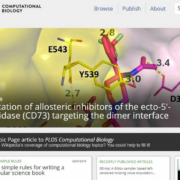Laurent CHALOIN’s work makes the front page of the PLoS Computational Biology website
Read the publication (Rahimova R et al, 2018)
The ecto-5’-nucleotidase (CD73) plays an important role in the production of immune-suppressive adenosine in the tumor micro-environment, and has become a validated drug target in oncology because of its high expression level on immune and cancer cells. In the tumor microenvironment, CD73-generated adenosine prevents the pro-inflammatory response and acts as a potent immune suppressor.
To circumvent the impact of CD73-generated adenosine, we applied an original bioinformatics approach to identify new allosteric inhibitors targeting the dimerization interface of CD73, which should impair the large dynamic motions required for its enzymatic function. Up to know, most of the existing inhibitors have been elaborated by analogy to the substrate (AMP) and act as competitive inhibitors. Here, by combining molecular dynamics and virtual screening, several hit compounds have been identified and showed a potent inhibition of the recombinant CD73 with a Ki in the low micromolar range. Moreover, the most active compounds exhibited a non-competitive inhibition mode that was in agreement with the targeted binding site.
The structure-activity relationships studies indicated that several amino acid residues located at the dimerization interface are involved in the tight binding of hit compounds and likely contributed for their strong inhibitory activity.
This study also highlights the existence of an unidentified allosteric binding site allowing modulation of the CD73 enzyme activity. Overall, the gathered information will guide the upcoming lead optimization phase that may lead to potent and selective CD73 inhibitors, able to restore the anticancer immune response.

